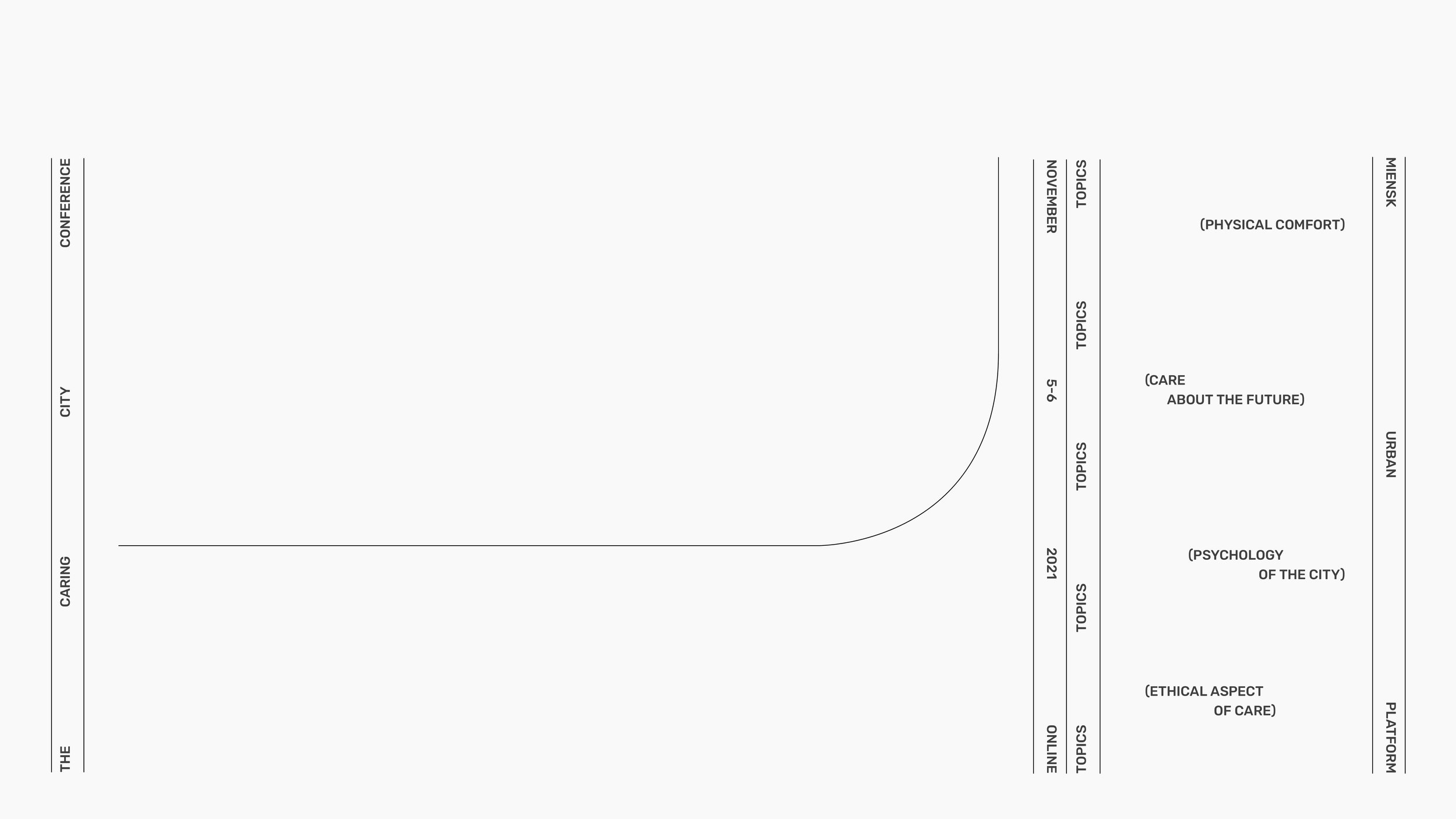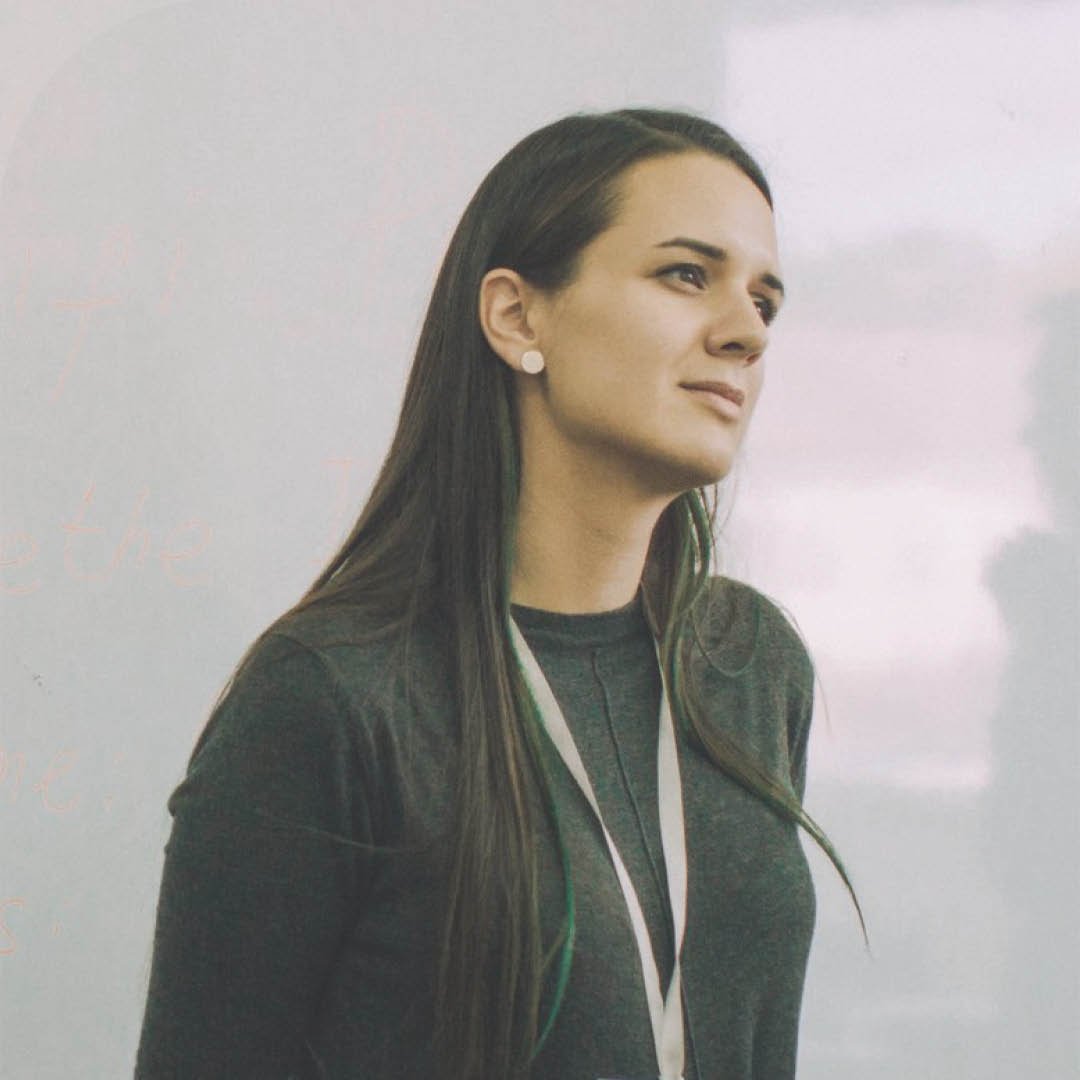
4th International Conference
of the Miensk Urban Platform
The caring city
05—06.11/2021
about conference
Cities in the XXI century are often considered in terms of management efficiency and resource allocation, functionality and commercial appeal.
However, such challenges as the lasting consequences of the pandemic, global warming, social and economic crises show the need to look at cities differently.
These challenges highlight the topic of care: when everyone may find themselves in a vulnerable position due to their physical and mental health, economic and social state.
Caring ceases to be a purely private matter of an individual, it becomes important for us to learn to take care not only of ourselves, but of each other, and of the environment around us.
The crisis of Care becomes a new challenge pushing us to reconsider the established practices of interaction with the city.
Individual biological and psychological needs of people are being paid little attention when planning cities and designing the urban environment. For example, not everyone has access to well-designed green spaces or universal sport grounds; not everyone can always meet basic needs in the city. To make these problems visible and find ways to solve them, we decided to try to use the principle of care as a way of providing support through the urban environment.
Tracing the relationships between care recipients (city residents) and caregivers (urban designers and planners) helped us look differently at the existing practices in the field of urban design and architecture, as well as discover new perspectives and new ways of solving the existing problems.
At the conference, we considered urban design practices and tools that help transform modern cities into spaces of care. We believe that it is possible to create spaces that allow people to take care of themselves and others, as well as be open to be taken care of.
video
first day,
November 5, Friday
symposium
«SAFETY IN THE MODERN CITY»
01/ «SAFE URBAN ENVIRONMENT: INTERPRETATION AND MEASUREMENT»
Is it possible to translate such subjective categories as "comfort", "safety", "friendliness" of the urban environment into the language of numbers and empirically measured indicators? During the speaker's lecture, the experience of a similar measurement was described and its results were briefly presented.
ELENA LEBEDEVA, (MIENSK, BELARUS)
Candidate of Sociological Sciences, Associate Professor of the Department of Communication Technologies and Public Relations of BSU,
Doctoral candidate of the Department of Sociology of BSU.
02/ «GENDER AND SECURITY IN THE CITY»
At the lecture, Nastya spoke about feminist urbanism and the gender aspect of safety in urban space. How come women* feel unsafe in the city? What measures can be taken to correct this, and are design and planning changes alone sufficient?
ANASTASIA KRASILNIKOVA, (MOSCOW, RUSSIA)
Feminist researcher, co-founder of FEM TALKS,
The author of The fem walks project.
«The Caring City: building spaces that prioritize life»
Cities are built on the basis of the division into public and private, which connects the concept of care with the domestic sphere and women. However, many of our actions to sustain life are carried out in public places. We need to start thinking about cities by prioritizing the need for care and commitment to social community responsibility.
LECTURE
BLANCA VALDIVIA, (BARCELONA, SPAIN)
PhD in Urban and Architectural Management and Valuation (Barcelona School of Architecture), defended her thesis on "The Caring City: the quality of life from a feminist perspective",
Member of Col·lectiu Punt 6, a cooperative of architects, sociologists and urban planners from different places with more than 15 years of work experience. The cooperative works on redefining private and public spaces so that they promote diversity without discrimination or hierarchies.
«SANATORIUMS AS SPACES OF CARE»
How do new attitudes towards work and leisure transform the practices of using spaces for wellness? Is there a place for Soviet sanatoriums in a new context in which our cities found themselves? During the dialogue, Konstantin, Georgy and Sofia discussed the features of the phenomenon of well-being, talked about sanatoriums as objects of heritage and tried to determine their role in the lives of citizens in the modern context.
DUALOGUE
KONSTANTIN BUDARIN, (MOSCOW, RUSSIA)
Spatial development project manager, architectural researcher,
Co-creator of Sanatorium Premium and Telegram channel Less is a bore \ Лес и забор.
SOFIA SAVELYEVA, (MOSCOW, RUSSIA)
Curator of special projects at the Strelka Institute, account manager of the Instagram blog Sanatorium Premium,
Organizer of cultural and educational trips to sanatoriums in Russia.
GEORGY ZABORSKI, (MIENSK, BELARUS)
Architect, researcher of architecture and territorial development projects based on actor-network theory and non-human-centered design,
Worked on the development of the spatial environment of large companies - Rosatom, EPAM Systems, Belgazprombank, as well as on the development strategy of large-scale residential developments (A-100 Development).
"The help of science in the fight against stress in the context of global pandemic"
At the lecture, Marta explained how a person and their brain reacts to prolonged threat and isolation; how to organize space and workplace to minimize the impact of long hours of work behind a screen; how people cope with stress and anxiety, and why psychology is needed more than ever; as well as what examples of researches on distant onlin care exist.
LECTURE
MARTA PIVOVARENKO, (KYIV, UKRAINE)
International psychologist and researcher of the impact of traumatic stress and mental health recovery issues with 19 years of experience in psychotherapy, training and supervision in Ukraine, Lithuania, Belarus, Poland, USA.
SECOND DAY,
November 6, Saturday
SYMPOSIUM
«SENSORY LANDSCAPES OF THE CITY»
01/ «THE CITY'S SOUNDSCAPE AND COMFORT»
At the lecture, Andrey talked about the city soundscape, social and physical factors of experiencing urban noise, and the role of the landscaping planning solutions and the traffic in the city soundscape.
ANDREY VAZYANAU, (MIENSK, BELARUS)
Anthropologist, sound designer, researcher of the Miensk Urban Platform,
He has a PhD from the University of Regensburg and teaches at the European Humanities University.
02/ «NEW RESIDENTIAL AREAS: FROM DEVELOPMENT TO APPROPRIATION OF NEW URBAN SPACES BY CITIZENS»
Sense of smell is one of the most important abilities of a person, with the help of which they learn about the environment. At the lecture, Ekaterina talked about the experience of the residents of a new residential area, which is surrounded by unpleasant odors due to the sewage and garbage facilities located nearby. From the lecture you can learn how unfulfilled expectations can force residents to take action and take care of themselves.
KATERYNA SHISHOVA, (MOSCOW, RUSSIA)
Junior researcher of the Scientific and Educational Laboratory of Social Research of the City, Faculty of Urban and Regional Development,
Lecturer at the Faculty of Urban and Regional Development.
03/ «THE STORY OF ONE TACTILE GARDEN»
In her speech, Ilona will talk about the project of the Miensk urban platform with the main emphasis, when designing the user experience, not on visual, but tactile impressions of children and adults.
ILONA ELYASHEVYCH, (MIENSK, BELARUS)
Architect, urbanist, project manager of the Miensk Urban Platform,
Junior researcher of the Urban Planning Department of the Belarusian National Technical University.
SYMPOSIUM
«CARE WITHOUT EXCEPTION»
01/ «WHY CHILDREN SHOULD BE TAKEN INTO ACCOUNT WHEN DESIGNING THE STREETS»
The speaker talked about the importance of involving children in urban projects, she gave practical examples and explained why the global movement for a child-friendly city is gaining momentum.
ANNA SIPRYKOVA, (NEW YORK, USA)
Urban planner and placemaking specialist, co-author of the book Designing Streets for Kids,
Project manager at NACTO (USA), where she promotes the concept of "City for children".
02/ «DESIGNING A CARING CITY»
At the lecture, based on the example of Swiss European standards, Aleksey told how the urban space is perceived by elderly people, children, people with disabilities and other vulnerable citizens. Also he talked about the way the design and architecture can change the city for them.
ALEKSEY RADCHENKO, (MOSCOW, RUSSIA)
Urbanist, urban and transport planning expert,
Author of the Map of accidents project with information on accident statistics in cities, author of the project on analysis of public transport transmetrika.com.
03/ «CITIES WHERE NOT EVERYONE IS AT HOME»
In her speech, the lecturer shared the research experience conducted together with the "Nochlezhka" charitable organization. From the lecture, we learned about the ways and the reasons for elements of hostile architecture to be created in the urban environment, why it is difficult to work with statistics on homelessness, and what words are better to use when talking about people who find themselves on the street.
MARIA VYATCHINA, (SAINT-PETERSBURG, RUSSIA)
Researcher at the Center for Independent Sociological Research,
A junior researcher at the Institute of Interdisciplinary Media Research of the European University in St. Petersburg, she is writing her dissertation at the University of Tartu.
«HOMO URBANUS. CARE IN MEGAPOLIS»
At the lecture, the speaker talked about the concept of sensory gating, mental maps, communication clusters, transgression and other important moments related to the care in megapolis.
LECTURE
MARINA PREPOTENSKAYA, (KYIV, UKRAINE)
Doctor of Philosophical science, Professor of the Department of Philosophy at NTU “KPI named after Igor Sikorsky”,
Author of the monographs "Philosophy of Rhetoric", "Homo Urbanus - human of the metropolis",
Author of more than 50 scientific articles and publications on urban platforms. Many articles can be found here,
Member of the Union of Writers and the Union of Journalists of Ukraine, the World Federation of Poets "Poetas del Mundo", the Balkan Union of Writers, the Franco-Ukrainian Association "ART culture et creativité", the "Association of Philosophical Art".














